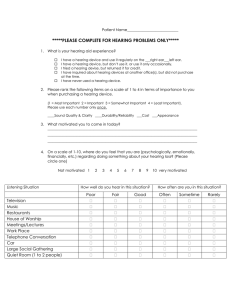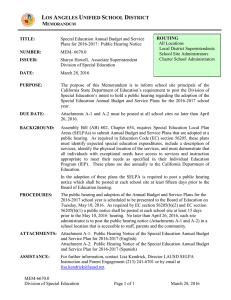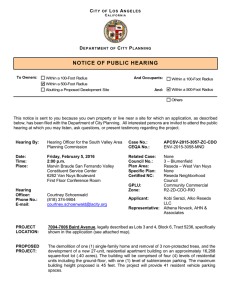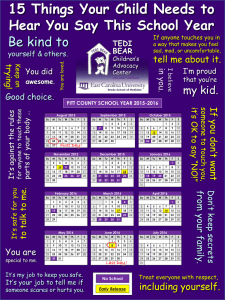Chapter 6 Citizen Participation Plan
Anuncio
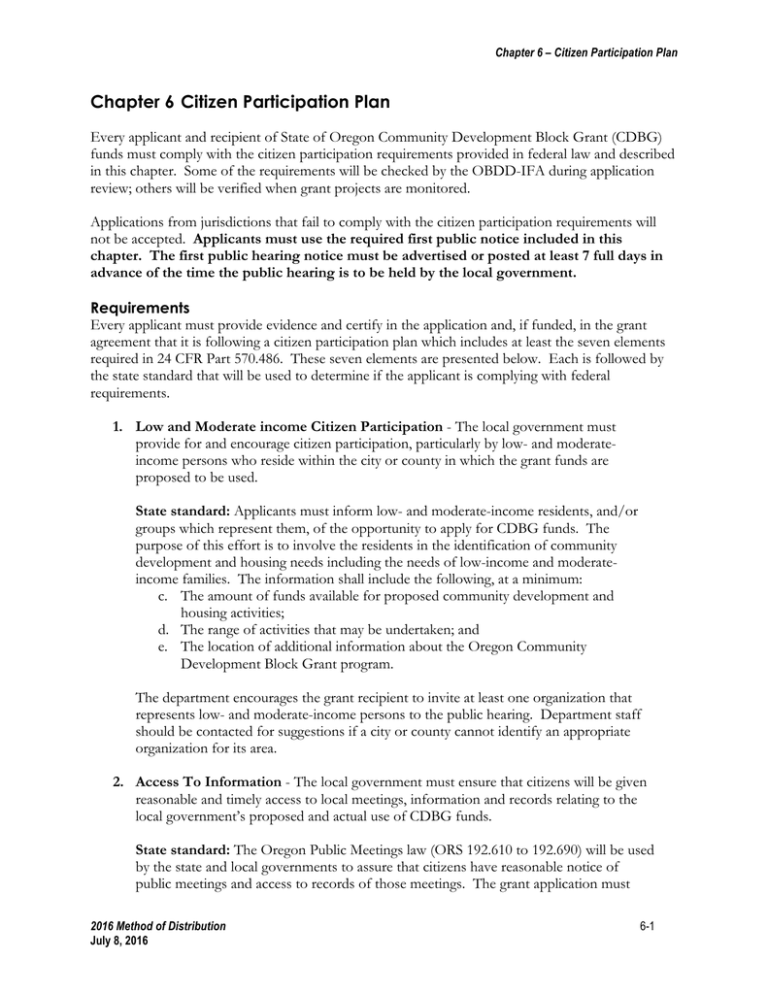
Chapter 6 – Citizen Participation Plan Chapter 6 Citizen Participation Plan Every applicant and recipient of State of Oregon Community Development Block Grant (CDBG) funds must comply with the citizen participation requirements provided in federal law and described in this chapter. Some of the requirements will be checked by the OBDD-IFA during application review; others will be verified when grant projects are monitored. Applications from jurisdictions that fail to comply with the citizen participation requirements will not be accepted. Applicants must use the required first public notice included in this chapter. The first public hearing notice must be advertised or posted at least 7 full days in advance of the time the public hearing is to be held by the local government. Requirements Every applicant must provide evidence and certify in the application and, if funded, in the grant agreement that it is following a citizen participation plan which includes at least the seven elements required in 24 CFR Part 570.486. These seven elements are presented below. Each is followed by the state standard that will be used to determine if the applicant is complying with federal requirements. 1. Low and Moderate income Citizen Participation - The local government must provide for and encourage citizen participation, particularly by low- and moderateincome persons who reside within the city or county in which the grant funds are proposed to be used. State standard: Applicants must inform low- and moderate-income residents, and/or groups which represent them, of the opportunity to apply for CDBG funds. The purpose of this effort is to involve the residents in the identification of community development and housing needs including the needs of low-income and moderateincome families. The information shall include the following, at a minimum: c. The amount of funds available for proposed community development and housing activities; d. The range of activities that may be undertaken; and e. The location of additional information about the Oregon Community Development Block Grant program. The department encourages the grant recipient to invite at least one organization that represents low- and moderate-income persons to the public hearing. Department staff should be contacted for suggestions if a city or county cannot identify an appropriate organization for its area. 2. Access To Information - The local government must ensure that citizens will be given reasonable and timely access to local meetings, information and records relating to the local government’s proposed and actual use of CDBG funds. State standard: The Oregon Public Meetings law (ORS 192.610 to 192.690) will be used by the state and local governments to assure that citizens have reasonable notice of public meetings and access to records of those meetings. The grant application must 2016 Method of Distribution July 8, 2016 6-1 Chapter 6 – Citizen Participation Plan include copies of public notices and minutes from meetings about the local community development program. Local governments must provide citizens with access to information and records about their community development program and any proposed application in accordance with the Oregon Public Records law (ORS 192.001 to 192.505). 3. Required Information - The local government must furnish citizens information, including, but not limited to: a. The amount of CDBG funds expected to be made available for the current fiscal year (including the grant and anticipated program income); b. The range of activities that may be undertaken with the grant funds; c. The estimated amount of grant funds proposed to be used for activities that will meet the national objective of benefit to low- and moderate-income persons; and d. The proposed activities likely to result in displacement and the local government’s antidisplacement and relocation plans required under 24 CFR Part 570.488, Part 570.606, and Part 42. State Standard: The “Public Notice and Notice of Public Hearing” included within this chapter must be used for this first hearing and for meeting this federal regulation. The first public hearing notice must be advertised or posted at least 7 full days in advance of the time the public hearing is to be held by the local government. Some detail in the required notice will need to be inserted by the applicant (e.g., amount of grant funds proposed to be used). Information in the notice about the amount of CDBG funds available and the range of activities that may be undertaken may vary during the program year. The final approved meeting minutes must record/document that items a-d above were addressed during the public meeting. On July 20, 2012 OBDD-IFA Management determined that the final approved meeting minutes could be submitted in one alternate format, MP3. Otherwise the final approved meeting minutes must be submitted in writing. 4. Technical Assistance - The local government must provide technical assistance to groups representing persons of low and moderate income that request assistance in developing proposals in accordance with the procedures developed by the department. Such assistance need not include providing funds to such groups. The level and type of assistance can be determined by the jurisdiction. State standard: The applicant must also describe in the application how it has responded to requests for technical assistance from groups representing low- and moderate-income persons, such as community action agencies. The level of assistance provided can be determined based on the applicant’s staff and budget limitations. 5. Public Hearings - The local government must provide for a minimum of two public hearings, each at a different stage of the project, for the purpose of obtaining citizen’s views and responding to proposals and questions. Together, the hearings must cover community development and housing needs, development of proposed activities and a review of program performance. 2016 Method of Distribution July 8, 2016 6-2 Chapter 6 – Citizen Participation Plan The public hearing to cover community development and housing needs must be held before submission of an application to the state. There must be reasonable notice of hearings and they must be held at times and locations convenient to potential and actual beneficiaries, with accommodations for the handicapped. To meet the reasonable notice requirement the first public hearing notice must be advertised or posted at least 7 full days in advance of the time the public hearing is to be held by the local government. Public notices and hearings shall be presented and conducted in a manner to meet the needs of non-English speaking residents who can reasonably be expected to participate. State standard: The governing body of the applicant (city council or county board of commissioners) must provide for a minimum of two public hearings at different stages of the grant project. Together, the hearings must cover community development and housing needs, development of proposed activities and a review of program performance. Hearing #1 - The purpose of the first hearing is for the city council or county board of commissioners to take comments from citizens about both community development needs and the project proposed for grant funding prior to submitting an application to the department. The notice form included in this chapter must be used for the first hearing. The first public hearing notice must be advertised or posted at least 7 full days in advance of the time the public hearing is to be held by the local government. The first public hearing must be no more than 12 months old and preferably conducted during the same program year using the appropriate notice contained within this Method of Distribution. The final approved meeting minutes must be submitted with the application. On July 20, 2012 OBDD-IFA Management determined that the final approved meeting minutes could be submitted in one alternate format, MP3. Otherwise the final approved meeting minutes must be submitted in writing. Hearing #2 - The purpose of the second hearing is for the city council or county board of commissioners to review the results of the project with citizens and to take comments about the local government’s performance as part of the grant closeout process. A model notice for the second hearing is included in the Grant Management handbook. Each hearing must be held with enough advance notice to ensure adequate opportunity for interested citizens and groups to participate. Public hearing notices must be advertised or posted at least 7 full days in advance of the time the public hearing is to be held by the local government. Applicants must provide copies of the public notice, affidavit of publication or certification of posting, and final approved copy of the hearing minutes from the first public hearing with the grant application and the second hearing prior to project completion. The final draft of the application must be made available to the public once it is submitted, if not before. NOTE: On July 20, 2012 OBDD-IFA Management determined that the final approved meeting minutes could be submitted in one alternate format, MP3. Otherwise the final approved meeting minutes must be submitted in writing. 2016 Method of Distribution July 8, 2016 6-3 Chapter 6 – Citizen Participation Plan In the grant application, the city or county must describe how it determined whether or not non-English speaking residents were expected to participate. This information can be accessed on the American Fact Finder web site. The information includes statistics about the languages spoken at home, ability to speak English, and linguistic isolation of persons living in each city and county. If any non-English language population constitutes five percent (5%) or more of the population, then the public hearing notices are required to be published or posted in those languages. The Spanish language version of the first required public hearing notice is included in this chapter. Applicants needing assistance in reaching other language groups should contact department staff for advice. Note: Refer to the “Note” in Chapter 7 for a description of the environmental and uniform relocation and real property assistance (URA) trigger guidance. More detailed information can be found in the current Grant Management Handbook. 6. Opportunity to Comment on Proposed and Actual Activities - The local government shall provide citizens with reasonable advance notice of, and opportunity to comment on, proposed activities in an application to the state and, for grants already made, activities which are proposed to be added, deleted or substantially changed from the local government’s application to the state. Substantially changed means changes made in terms of purpose, scope, location or beneficiaries as defined by criteria established by the state. State standard: The public must be provided the opportunity to comment on a proposed application at the public hearing held for that purpose (“first” hearing) and/or to submit written comments in accordance with instructions provided in the hearing notice. Recipients must provide a similar opportunity for the public to comment on significant changes in an approved project. Generally, this means that if the grant recipient seeks to move grant funds to an activity that was not part of the approved project budget in the grant contract, a public hearing must be held with appropriate notice. Department staff will help the recipient determine when a proposed change is significant enough to require a hearing. 7. Timely Response to Complaints - The local government shall provide citizens the address, phone number, and times for submitting complaints and grievances, and provide timely written answers to written complaints and grievances, within fifteen (15) working days when practical. State standard: If awarded a grant, the local government will be monitored by department staff for compliance with all applicable federal and state regulations. Part of this monitoring will include checking to see that the grant recipient provides a prompt, written response to all written complaints concerning the community development program and grant project. 2016 Method of Distribution July 8, 2016 6-4 Chapter 6 – Citizen Participation Plan Required Notice For Public Hearing #1 Note: The notice on the next page is for the first required public hearing. The purpose of the hearing is to take comments from citizens on both the community development and housing needs in the city or county and the project proposed for grant funding. The final approved meeting minutes must record/document that this requirement was met. NOTE: On July 20, 2012 OBDD-IFA Management determined that the final approved meeting minutes could be submitted in one alternate format, MP3. Otherwise the final approved meeting minutes must be submitted in writing. The notice must be published or posted by the applicant at least 7 full days in advance of the time the public hearing is to be held by the local government. 2016 Method of Distribution July 8, 2016 6-5 Chapter 6 – Citizen Participation Plan Public Notice and Notice of Public Hearing The (city/county) is eligible to apply for a 2016 Community Development Block Grant from the Oregon Business Development Department. Community Development Block Grant funds come from the U.S. Department of Housing and Urban Development. The grants can be used for public facilities and housing improvements, primarily for persons with low and moderate incomes. Approximately $11.5 million will be awarded to Oregon non-metropolitan cities and counties in 2016. The maximum grant that a city or county can receive is $2,500,000. The (city/county) is preparing an application for a 2016 Community Development Block Grant from the Oregon Business Development Department for (name of project, location, and purpose). It is estimated that the proposed project will benefit at least (number) persons, of whom (percentage) will be low or moderate income. A public hearing will be held by the (city council/board of commissioners) at (time) on (day) at the (location). The purpose of this hearing is for the (city council/board of commissioners) to obtain citizen views and to respond to questions and comments about: community development and housing needs, especially the needs of low- and moderate-income persons, as well as other needs in the community that might be assisted with a Community Development Block Grant project; and the proposed project. Written comments are also welcome and must be received by (date) at (address). Both oral and written comments will be considered by the (city council/board of commissioners) in deciding whether to apply. The location of the hearing is accessible to persons with disabilities. Please contact (name of contact person/office) at (telephone number) if you will need any special accommodations to attend or participate in the meeting. More information about Oregon Community Development Block Grants, the proposed project, and records about the (city/county’s) past use of Community Development Block Grant funds is available for public review at (location) during regular office hours. Advance notice is requested. If special accommodations are needed, please notify (name of contact person/office) at (telephone number) so that appropriate assistance can be provided. Permanent involuntary displacement of persons or businesses is not anticipated as a result from the proposed project. If displacement becomes necessary, alternatives will be examined to minimize the displacement and provide required/reasonable benefits to those displaced. Any low- and moderateincome housing that is demolished or converted to another use will be replaced. 2016 Method of Distribution July 8, 2016 6-6 Chapter 6 – Citizen Participation Plan Aviso Público y Noticia de Audiencia Pública La (ciudad/condado) es elegible para aplicar a un Subsidio en 2016 del Community Development Block Grant que a su vez viene del Oregon Business Development Department. Los Subsidios del Community Development Block Grant (Bloque Subsidiario para el Desarrollo Comunitario) vienen desde el U.S. Department of Housing and Urban Development (Departamento de Vivienda y Desarrollo Urbano de los Estados Unidos). Los subsidios pueden ser usados para instalaciones públicas y remodelación de casas, primariamente por personas con ingresos moderados o bajos. Aproximadamente $11.5 millones serán otorgados en 2016 a ciudades y condados no-metropolitanos de Oregon. El máximo de subsidios que la ciudad o el condado puede recibir es $2,500,000. La (ciudad/condado) está preparando una aplicación en 2016 para el subsidio del Community Development Block Grant que viene del Oregon Business Development Department para (nombre del projecto, ubicación y propósito). Está estimado que el projecto propuesto beneficiará a por lo menos (número) personas, de los cuales (porcentaje) serán de ingresos moderados o bajos. Una audiencia pública se llevará a cabo por el (consejo de la ciudad/junta de comisionados) a las (tiempo) del (día) en la (ubicación). El propósito de esta audiencia es para que el (consejo de la ciudad/junta de comisionados) obtenga puntos de vista de los ciudadanos y para responder preguntas acerca de: Desarrollo comunitario y necesidades de vivienda, especialmente las necesidades de personas con ingresos moderados y bajos, así como también otras necesidades en la comunidad que podrían ser asistidas con un subsidio del projecto Community Development Block Grant; and El projecto propuesto. Los comentarios escritos son también bienvenidos y deben ser recibidos el (día) en la (dirección). Ambos comentarios, escritos y orales serán considerados por el (consejo de la ciudad/junta de comisionados) en decidir si aplican. La ubicación de la audiencia es accesible para personas con incapacidades. Por favor dejar (nombre de la persona de contacto/oficina) el (número de teléfono) para saber si usted necesitará cualquier tipo de acomodaciones especiales para asistir o participar en la reunión. Más información sobre el Oregon Communitty Development Block Grants, el projecto propuesto y los pasados registros sobre la (ciudad/condados) en el uso de los subsidios del Community Development Block Grant están disponibles para la revisión pública en la (ubicación) durante las horas regulares de oficina. Se requiere del aviso anticiapado. Si las acomodaciones especiales son necesitadas, por favor notifíquelo (nombre de la persona de contacto/oficina) el (número de teléfono) de modo que la asistencia apropiada pueda proveerse. La desalojamiento involuntaria permanente de personas o negocios no es esperada como un resultado del projecto propuesto. Si la desalojamiento llegara a ser necesaria, serán examinadas alternativas para minimizar la desalojamiento y proveer beneficios requeridos/razonables para quellos removidos. Calquier casa de ingreso moderado y bajo la cual sea demolida o convertida en otro uso será reemplazada. 2016 Method of Distribution July 8, 2016 6-7 &KDSWHU±&LWL]HQ3DUWLFLSDWLRQ3ODQ This page intentionally left blank. 2016 Method of Distribution July 8, 2016 6-

